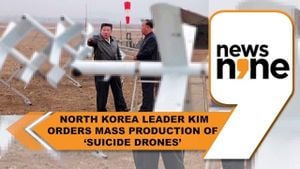Recent geopolitical shifts are reshaping the economic environment as the world adjusts to the outcomes of the latest U.S. presidential election, which has drawn attention back to trade relations, particularly between the U.S. and China. Donald Trump's return to the political forefront has stirred apprehensions among global markets, with his past rhetoric and policies during his first term beginning to loom large over international trade dynamics.
Trump's victory ushers in discussions about looming tariffs and trade wars reminiscent of his first administration. One of the president-elect's most notable campaign promises was to impose hefty tariffs, potentially reaching 60% on Chinese goods. This pledge raises questions about how a new wave of protectionism under his leadership might influence economies across Asia, which are tied closely to China's market and manufacturing sectors.
Following the win, analysts have quickly assessed the potential aftermath of such tariffs. Speculation suggests they could disrupt global supply chains significantly, particularly affecting Southeast Asia. For countries like Indonesia, which heavily rely on exports, the threats posed by possible reductions in U.S. demand for Chinese products could ripple through their economies.
Adam Ahmad Samdin, of Oxford Economics, stated, "Lower U.S. demand for Chinese goods due to higher tariffs on China will translate to lower demand for ASEAN exports, even if direct U.S. tariffs aren’t levied on those economies.” Given this outlook, nations such as Thailand, Vietnam, and the Philippines may also face potential risks, depending on how intertwined their economies are with the U.S.
Vietnam's unique positioning as a favorable export destination has garnered interest—notably for its electronics sector, which has flourished with the relocation of manufacturing as companies seek alternatives to direct ties with China. This trend, dubbed the "China+1" strategy, was initiated during Trump's previous administration, prompting investment channels to diversify. Companies like Foxconn and Samsung have shifted eyes toward Vietnam, transforming it rapidly and making it the second-largest exporter of smartphones globally, just behind China.
Yet, with this new administration, there are concerns Vietnam could become part of the trade conflict line of fire should Trump make good on his tariff threats against electronics routed through the country from China. Lloyd Chan, from MUFG, remarked how the targeting of Vietnam's growing electronics sector isn’t far-fetched with Trump at the helm.
Despite facing increased scrutiny, the notion of moving manufacturing away from China may seem attractive on the surface. Investors have remained optimistic about the potential for the "China+1" strategy to bolster other Asian economies, but economic experts caution against the expected challenges. Thomas Helbling from the IMF noted the potential increased costs and loss of efficiency from redistributed supply chains, which could lead to higher consumer prices globally.
Protectionist policies promoted during Trump’s campaign have not just limited their reach to China but seem poised to encircle other nations, including India. With concerns surrounding the heavy reliance on Chinese components within Indian exports, Indian policymakers are watching the developments closely. Concerns ran high as Ajay Srivastava from the Global Trade Research Initiative illustrated how tariffs on Indian goods could render them less competitive.
"Trump is a transactional person," Srivastava mentioned, hinting at how the U.S. may leverage its influence to negotiate lower tariffs on its products marketed within Indian borders. This scenario places Indian exporters under added pressure to adapt quickly to shifting terms of trade, all the more pressing with timelines tightened by election results.
Still, amid these turbulent waters, some positive angles may surface. The potential for the establishment of factories outside China could roll out newfound economic strategies among Asian businesses wishing to mitigate the risks tied to U.S.-China tensions. Many have begun to explore new locations, with countries like Malaysia and Thailand becoming popular alternatives for manufacturing. Bruno Jaspaert from the European Chamber of Commerce highlighted opportunities for businesses to seek diverse backdrops for production bases, which could lead to long-term economic resilience.
Trump's return to power implies significant challenges not just for Asia but also for global markets at large. While areas of growth might arise from companies relocating production, the uncertainty of tariff impositions has left many market analysts on edge. Trade wars could paralyze economies moving forward for the foreseeable future as nations rethink how they engage each other on the international stage.
With every passing day, the potential for significant shifts becomes clearer, igniting debate and concern within both corporate boardrooms and government policies globally. It is against this backdrop of economic dynamism and unpredictability, spurred by Trump's anticipated policies, where the future of international trade will surely be forged anew.



